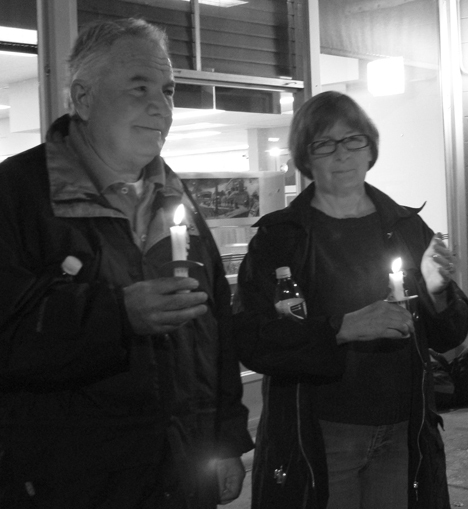By KATE HUNTER and JIM HAUSER
For The Beachcomber
A small band of Islanders gathered with candles last Wednesday to mourn the war casualties since the U.S. invasion of Afghanistan eight years ago.
On a day when the U.S. Senate approved a $626 billion defense budget to continue the wars in Iraq and Afghanistan, Bob and Donna Kellum, Islanders for 30 years, said they worry about their son.
“Nathan just returned from Afghanistan. If another 40,000 troops are sent, he will be one of them,” said Donna.
Nathan graduated in 2006 from Vashon High School. He is stationed in Kentucky, where he is a specialist in the Army Infantry assigned to the 101st Airborne Division.
“He’s coming home to visit this weekend,” Donna said.
As the cost of the Iraq and Afghanistan wars reached $1 trillion, Islander Marie Holert said, “I’d like to see the war end and the troops brought home and spend money on health care instead of war.”
After eight years of bloody conflict, Islanders expressed frustration.
“No one has ever been successful in (occupying) Afghanistan. The risk of alienating the people there and making us the target of their hostility is greater than any safety a military victory might provide us,” added Joyce Victor, another Islander.
Longtime peace activist Joy Goldstein held a sign reading “War is not the answer.” Reaction from passing drivers to the 14 Islanders at the vigil was largely supportive, but one driver shouted angrily, “What is the answer? You guys are crazy!”
Jessica Livosky said she fears no good solution. “I can’t believe that occupying a country with large numbers of U.S. soldiers can bring anything positive given Afghanistan’s history.”
“I don’t think there is a solution,” said Dave Rogers. “The sooner we get out, the fewer people will die.”
Mary Beth McCauley said, “We have to help rebuild and keep them safe.”
The number of dead in the Afghan war is difficult to calculate. The U.S. Department of Defense sets the number of U.S. deaths at
746 as of September but does not count those
wounded in Afghanistan who later die.
The United Nations Afghanistan Mission Assistance reports deaths of 11,152 Afghan soldiers. No one kept track of civilian deaths countrywide until 2006. As in most wars, civilians suffer the most, and estimates vary between 50,000 and 100,000.
Nathan’s dad Bob Kellum was vehement. “Just get the hell out.”
— Kate Hunter and Jim Hauser are Island activists.



